#the hunger games meta
Explore tagged Tumblr posts
Text
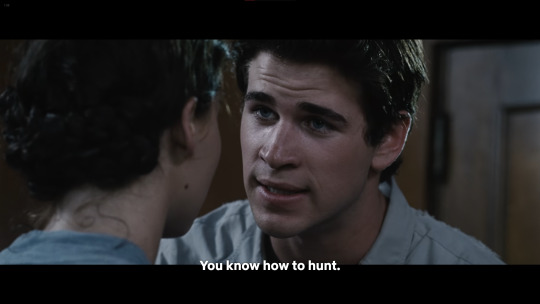
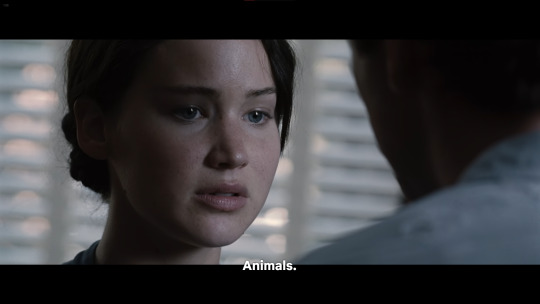
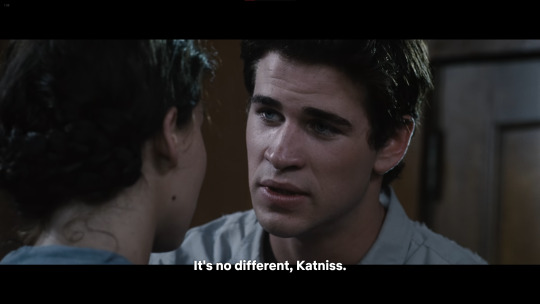
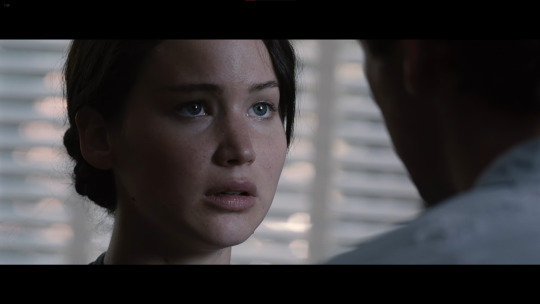
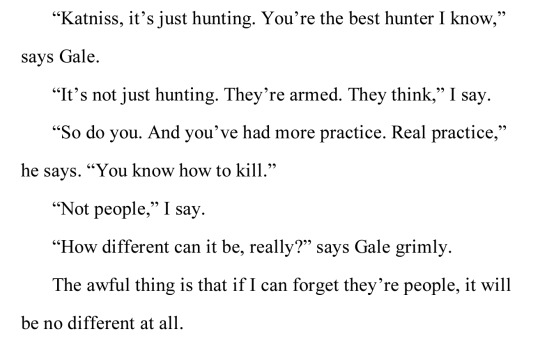
The Hunger Games, 2012 (Gary Ross) and The Hunger Games, 2008 (Suzanne Collins)
It's so interesting that, from the very beginning, Gale is established as someone who has a disregard for human life, and who does not truly view those different from him as "people." We see this here, where he dehumanises the children Katniss will have to fight in the Games. We see this in Gale's vocal resentment of Madge Undersee, in how he despises her for the privilege she was born with and grew up with.
This "us vs. them" infighting and mentality that Gale falls for (a mentality that the Capitol propagates, and that the Games act as a metaphor for) is one that eventually leads him to kill innocent children.
This thinking is also something Katniss must learn to break out of -- when she grapples with killing her opponents in the Games, who are truly just children, or when she realises "who the real enemy is" at the end of Catching Fire.
But Gale is unable to grow past this. He's willing to kill children (!) who are innocents, who haven't committed any crime other than being born in the wrong place at the wrong time -- just like Madge, who Gale despised in Book 1.
And Gale obviously DOES feel bad about "killing" Prim. But what's worse is the thought that, if it wasn't Prim who died, if it was just some random faceless people, would Gale still care?
I think Gale is a really interesting character whose development is so tragic yet still makes so much sense. It's a shame to see people write him off so quickly without seeing the analytical, thematic, and political value that we can gain by exploring his story and ideology.
#the hunger games#hunger games#gale hawthrone#katniss everdeen#peeta mellark#catching fire#haymitch abernathy#mockingjay#thg#thg meta#the hunger games meta#primrose everdeen#interesting#finnick odair#long post#ballad of songbirds and snakes#president snow#lucy gray baird
2K notes
·
View notes
Text
I wanted to make a proper post about Katniss' crush on Peeta before, during and after the games after reblogging that post. So getting my screenshots from there and adding some more
Had to divide thg and sequels for how long the post had become.
Before starting, I must say I love how Suzanne Collins writes the teen characters as teens instead of being mature for their ages or acting like they are in their mid 20s/30s. This is how I'd imagine a teenager, who had to grow up in dystopian AU and has only survival in her mind, deal with emotions.
Evidence for Katniss' crush on Peeta in The Hunger Games
Let's start with Katniss' reaction to Peeta being reaped:
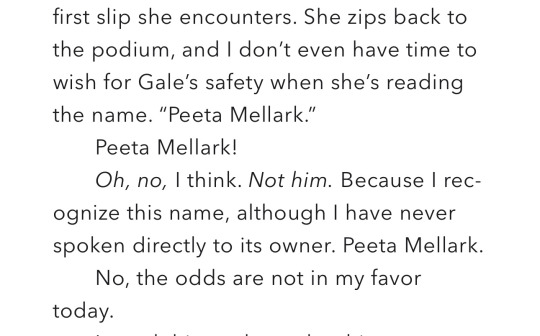
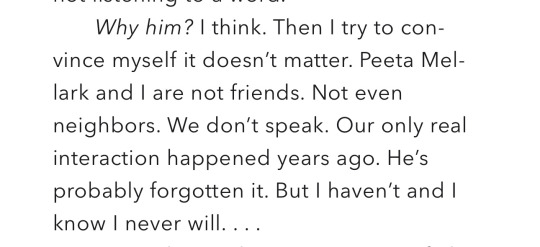
Katniss associating Peeta with spring and dandelion:
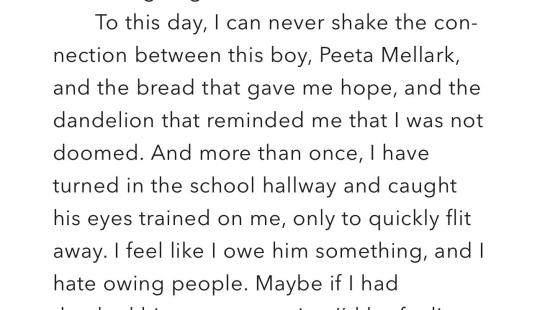
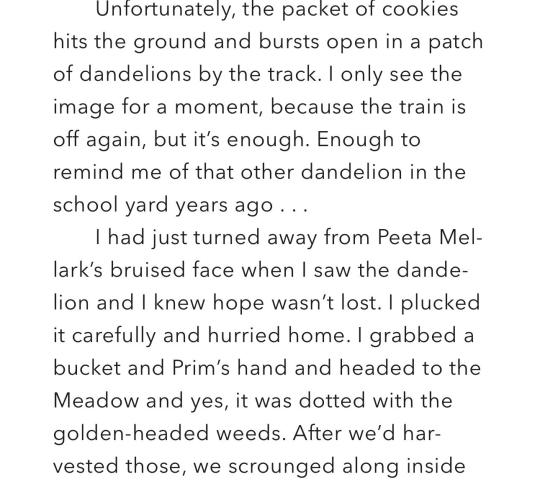
Katniss noticing things about him in the past Part 1
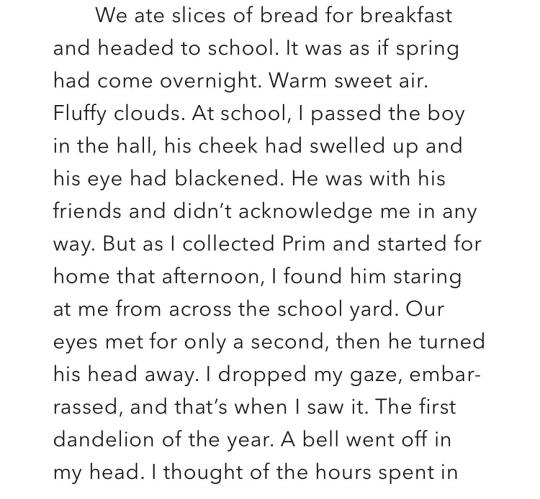
Katniss noticing things about him in present Part 2:
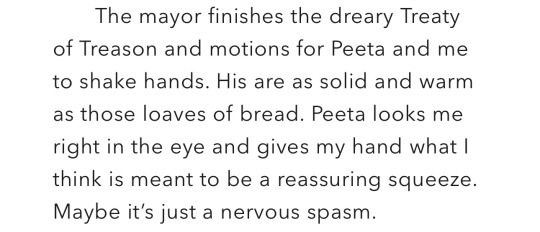
Katniss getting immediately defensive when Haymitch strikes Peeta:

She finds comfort in Peeta and more importantly, he feels safe for her Part 1:
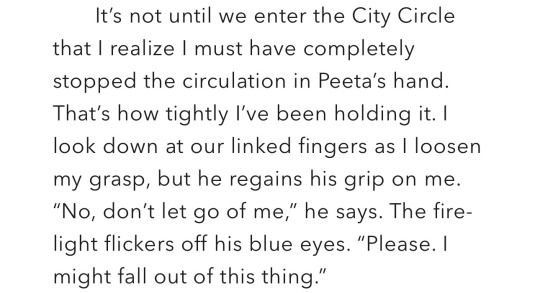
Katniss blushes upon receiving compliment from Peeta:
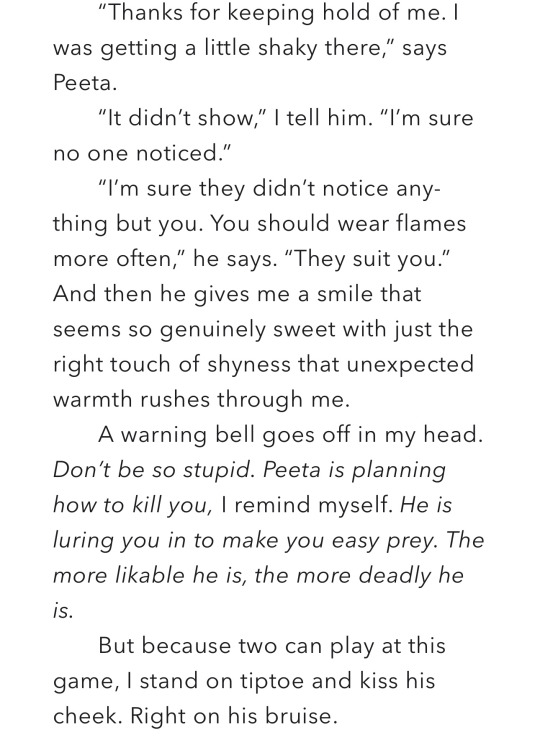
Katniss hasn't been talking to Peeta for a long time, yet she feel he's safe enough to reveal a secret like this Part 2:
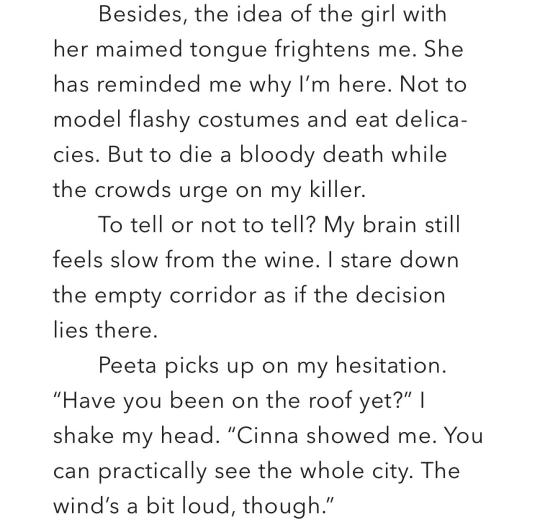
Katniss noticing Peeta and keeping track of him part 3
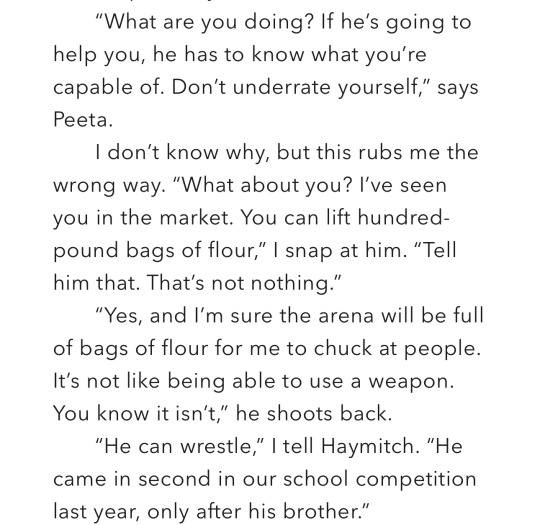

Katniss getting very defensive about Peeta suggesting she has a boyfriend:

Katniss blushing when she hears Peeta having a crush on her even though she quickly thinks he was lying:
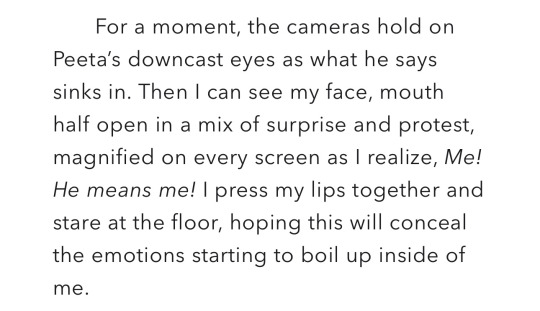
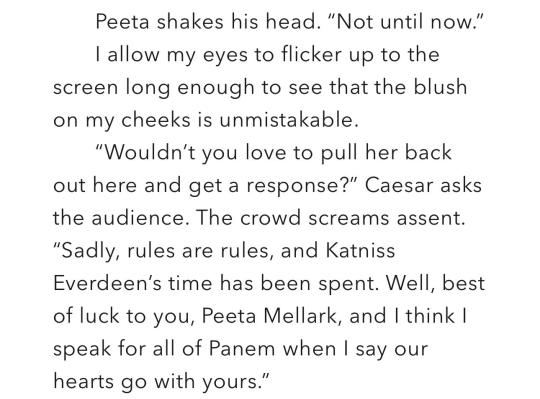
Katniss finding comfort and safety with Peeta once again:
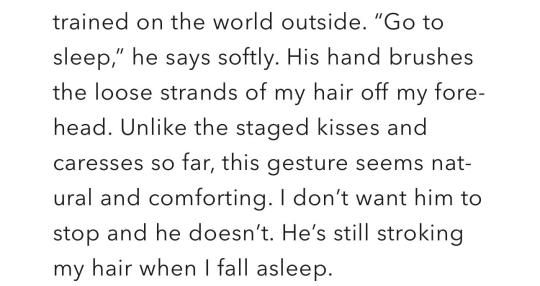
Katniss feels stirring in her when they kiss whilst being fully aware, and wants another kiss:
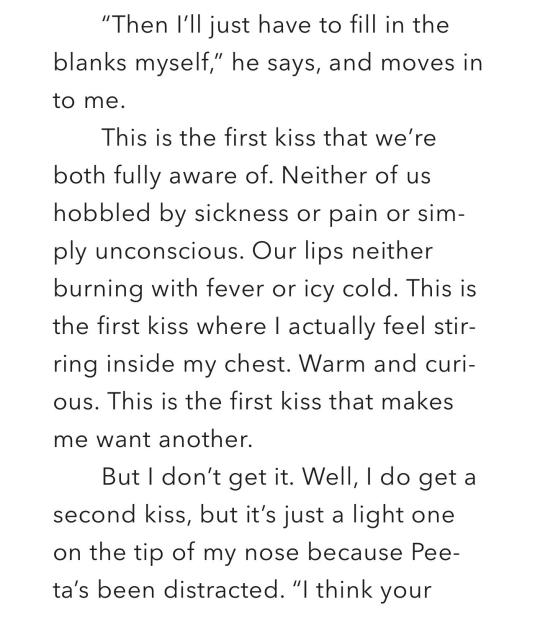
He makes her feel safe Part 3:
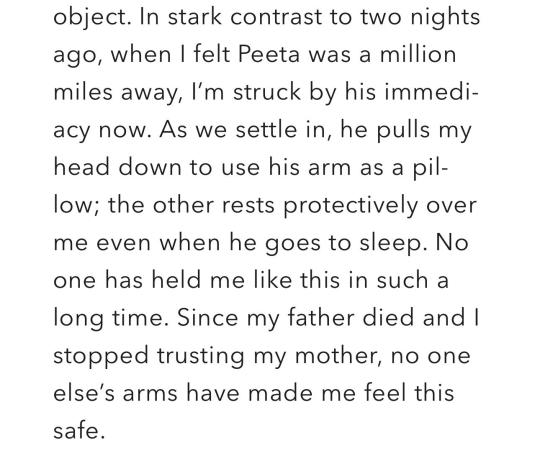
She kisses him for herself, not for audience:
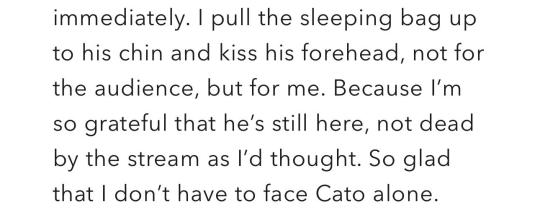
The implication of Peeta dying has Katniss shook:
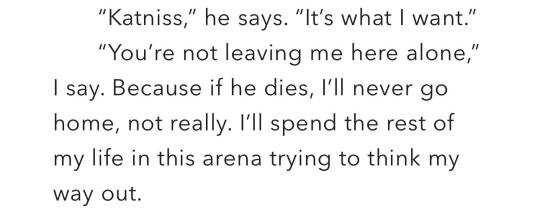
Even though they haven't been talking for a long time and she had had doubts about him, Katniss trusts Peeta with her life. Their backs turned each other, no way they can know if the other will actually go through with the plan. Yet they still trust each other. We know how hard it is for Katniss to open up and trust someone, but she does for Peeta for her own life:
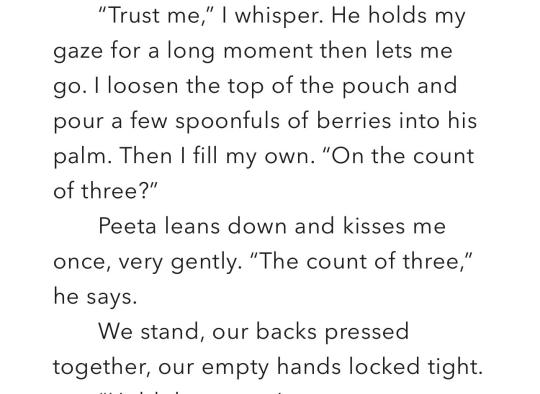
#katniss everdeen#peeta mellark#katniss and peeta#the hunger games#hunger games#thg#everlark#peeniss#suzanne collins#peeta x katniss#katniss x peeta#thg meta#the hunger games meta
238 notes
·
View notes
Text
i know this conversation comes up every now and then, but i am again thinking about the lack of organized religion and other preexisting culture in panem outside of the mentioned traditions in each district.
this is really in my mind today because at the start of chapter 5 in catching fire when haymitch brings katniss and peeta through the hallways in the justice building in district 11, she mentions the room prepared for their use has “double doors,” “the ceiling must be twenty feet high,” there are “designs of fruit and flowers cut into the molding, and small, fat children with wings look down at [them] from every angle.”
this passage is strongly reminiscent of a church with cathedral ceilings that are adorned with cherubs, and it also implies that katniss does not know what cherubs are (or really the idea of angels at all for that matter).
considering district 11 is placed in the bible belt, i think this is a really interesting detail, and given katniss’s earlier details about how the justice building is worn and smells of mildew, it highlights how panem is likely using structures that existed before the country itself and how little they know about the world that existed before their country did.
it also shows how heavily united states ideals still influence panem, since though it is said to have “separation of church and state,” our country is very influenced by christian ideals, and these ideals are still somewhat looming over the people of panem.
#it also makes me wonder if maybe religion continues to exist in some form in d11#but not so much in the mountain seclusion of d12#though there are still some religious elements of 12#like how sunday is the day of rest#i was raised agnostic so this is as far as my commentary here can go really#but i’d love to explore this element more in the series#the hunger games#catching fire#katniss everdeen#peeta mellark#the hunger games meta#jess thinks#thg world building
164 notes
·
View notes
Text
TBOSAS Meta
This started as a couple-paragraphs-long Everlark & Coryo x Lucy Gray rant. It turned into an essay on the politics of systemic oppression and how we illustrate it in fiction, with The Hunger Games and Ballad as case studies. Regardless, I hope others enjoy, lol. This is where my brain lives, now, as I expect it will the rest of 2023. Cheers!
***
It’s been interesting, the last few days, some of the discourse that’s popped up around TBOSAS. FASCINATING political discussions, as I’ve come to expect for a Suzanne Collins release. (#1 in my heart.)
Personally, I always separate books vs. movie canon with her franchise. With the OG Hunger Games, sometimes I felt the films were better—like she got another pass at it and REALLY took advantage, and utilized the hell out of taking it out of Katniss’s first-person POV to develop other characters and the world (still without detracting from her narrative)—while for some details, I preferred the books.
With TBOSAS, though, the book and movie feel almost entirely different to me.
There are MANY shared elements, of course, and I feel either version gels quite nicely with the OG franchise. It’s not even that there’s that many continuity differences—some things cut or altered for time, sure, but the bones of the plot are the same. Both illustrate astute political commentary, Coriolanus’s descent into madness, Tigris’s shift in position on him (foreshadowing her full turn by Mockingjay), and Lucy Gray’s role in his life in both his initial downfall and his defeat by Katniss. The actors and creative team all did BEAUTIFUL work bringing it to life, and I honestly love both versions.
But fans who mainly like the book may be frustrated by the sympathy Coryo garners in the film.
Normally, I’d say this is because the book reveals more internal monologue—and it does. But honestly, one of the things I was most impressed by in this film was how legible the actors’ internal monologues were. It was clear, the amount of work they all did to that end. So I don’t know that it is just more. I think it’s also different.
Book Coriolanus devolves much earlier and more obviously. He starts from the same pressed circumstances and has moments of goodness, but he becomes the villain we know him eventually to be pretty damn fast.
Film-Coriolanus has a much slower descent. Ironic, honestly, given the film has far less time than the book does.
I think as a result of this, I’ve seen discourse comparing beats in his relationship with Lucy Gray to Katniss and Peeta. For example, that beautifully shot/choreographed/performed scene in TBOSAS with him and Lucy Gray on either side of the fence after the bombings that night, where they almost kiss and he asks her, “Is this real? If I’m going to risk everything?” being compared to Peeta’s long game of “real or not real” throughout Mockingjay. Everlark folks (rightfully) pointing out that for Peeta, the refrain is about shared trauma, especially between him and Katniss, and both of them grounding their relationship in mutual trust—while asserting that for Coryo, the same refrain comes from a place of selfishness.
I get where this opinion comes from: President Snow is probably one of the most violent, sadistic, genocidal dictators in modern popular fiction. His relationship with Lucy Gray started as transactional—even more acutely in the book. Nearly everything Book-Coryo does is for his or his family’s personal gain.
But to me, half the beauty and tragedy of the film is this delicious possibility—the hope—they showed us.
THG has always had a strong anti-war philosophy in general, with through-line commentary on showmanship, propaganda, surveillance and performance: The recurrent themes of cameras always bring on them, the arenas and entirety of Panem being a stage/game—and how those things impact authentic human relationships. Everlark hit for so many because of the ways authenticity bloomed out of that hellish, contrived pit. Coriolanus and Lucy Gray’s relationship started out similarly contrived: Thrown together by the politics of the Academy, the uprising, the districts, the Capitol and the Games—helping one another survive. Largely unlike Katniss and Peeta, they both played the game intentionally, to varying degrees. (Personality wise, these four really have almost nothing in common, lol.) Lucy Gray is a good person, both in the end and from her start (unlike the terrorist Coriolanus becomes). But she is a performer. He’s right about that.
So honestly, I don’t see much purpose in reading Peeta’s question as valid while Coryo’s wasn’t. I think that judgment is colored by dramatic irony—us knowing who they each become. But in theatre, we talk about living honestly in imagined circumstances. It’s used in a lot of acting techniques, but particularly for people playing villains. To stay grounded in the truth of it, you have to believe honestly in the imagined moment, not the gestalt; Leslie Odom Jr. was a great Aaron Burr because every performance, he believed in the whole journey, from hope to ruin. Tom Blythe was a great Coryo because he invested in the earnest reality of Snow as a young man, not the devil we know he becomes. And at that point in the story, at the cages that night with Lucy Gray, Coriolanus was honestly grounded in similar struggles as our OG heroes: Trying to provide for and protect his starving family. His family (and the Capitol at large) reeks of privilege, and his prejudices were obviously flawed. But in his developing love for her, he was steeped in starvation, the same political forces as lashed all citizens of Panem, and was clawing his way from beneath just as much Capitol propaganda as people from the Districts—perhaps even more so, given his Grandma’am and how his father died. Because of their given circumstances, politics bled into everything—but eventually, so did feeling, and they had several moments of genuine bonding, trust and connection which the actors invested in beyond their political need for each other. There’s a constant push and pull: Holding hands at the zoo for the cameras was political; her reaching for his hand in the arena visit was less so. The first “Stop treating me like I’ve already lost” in front of everyone was wit-soaked survival, while “Please don’t let me die in that arena tomorrow,” near-whispered and with hands held between them where the camera would struggle to see, bled into real vulnerability. Saving him from the other tributes in the cage-ride to the zoo was about survival; risking her life to go back for him when the arena was bombed was at least a mix. Her motivations for singing in her interview are complex—perhaps guilt that a “rebel” attack nearly killed Coriolanus, his advice she’d get the most money that way—but I feel strongly that a non-zero amount of her was motivated by wanting to demonstrate that she trusts him, which for her is even higher-prized than love. And I also feel that, after the hospital and her “final performance”—leading up to their near-kiss at the zoo—Coriolanus scoped out the arena (and ultimately took all those risks to help her cheat the Games) both because he wanted the Plinth prize, in theory, and because he increasingly desperately wanted her to live.
The waters between them were thoroughly, legitimately muddied—which I believe was intentional, that constant tension between authenticity and politics. And as much as he was falling for her, Coriolanus saw that Lucy Gray was just as clever and good at crowd-work as he was—maybe better.
So to circle all the way back to this Everlark comparison: Given the absurdly multilayered situation, is it really that selfish or unreasonable he would check in with her during that moment through the fence? That this child—wrapped in oppressive patriarchy, violence, starvation and propaganda—would ask for reassurance before he was willing to be vulnerable, or to potentially risk his family’s lives?
Some artists are hesitant to engage with the humanity of “villains,” their origins, because they feel humanizing them excuses them. In real life, I get this: Second chances aren’t always the answer, and people need to be held accountable. But isn’t it more powerful storytelling to demonstrate the corrosive nature of all systems of oppression in our fiction, to show how they can corrupt even those who try, than to condemn people before they’ve even had a chance? Isn’t the beauty of Lucy Gray’s whole thing that everyone starts out good, and it’s our job to choose to stay on the right side of that line?
And when President Coriolanus Snow finally chokes on his last rose, wouldn’t it be a more satisfying victory if we imagined him as a real-feeling person—full owner of sixty years of horrifying choices—rather than a cartoonishly evil cardboard cutout?
Book-Coryo has a more obviously manipulative/evil streak, much earlier on. To make it plain: He’s an ass, and his “love” for her reads more like obsession. But my favorite aspect of the film (and I feel one of the most compelling) was how it illustrated that these systems of oppression can make tragedies of almost anyone: All but those at the very, very top. Suzanne’s anti-capitalist politicking—how classism turns everyone below the 1% against each other, where the “upper middle class” (doctors/lawyers/actors) is vilified to the poor as a red herring while a handful of robber-baron CEOs amass almost all wealth on the planet—strikes again. She, Francis Lawrence, the film’s creative team and these actors came together to put tragically human faces on that struggle—how hard it is to stay a good person amidst intense, violent, systemic oppression.
But none of that sings quite as true if you go into it having decided that Coriolanus was evil in his bones. The stakes are so much higher, richer, otherwise. If his love—for Tigris, for his family, for Sejanus, and yes, for Lucy Gray—was, or became, authentic.
It’s not a descent into madness if he’s already mad. Or, as he put it in the original Hunger Games film: “Hope. It is the only thing stronger than fear.”
#the hunger games meta#thg meta#thg series#tbosas meta#meta#tbosas#the ballad of songbirds and snakes#ballad of songbirds and snakes#Everlark#suzanne collins#Coriolanus snow#President snow#tigris snow#lucy gray baird#coriolanus x lucy gray#Lucy gray x Coriolanus#sejanus plinth#theatre#directing#film#francis lawrence#tom blythe#josh andres rivera#rachel zegler#leslie odom jr#aaron burr#Hamilton#hamilton musical#acting#acting school
311 notes
·
View notes
Text
Wicked & The Hunger Games: an analysis on "evil"
I have been thinking (listening to the Wicked OBS, watching copious movie interviews, and always thinking about THG), and I think between the two medias you can draw a fairly comprehensive line in terms of how characters develop into evil within stories. Spoilers for THG and Wicked (both acts and the first movie) ahead :)
I'll be breaking this down to 5 different ways characters grow to interact and sometimes embrace evil. Starting with:
Not born evil, actively resists and struggles throughout the narrative, and ultimately remains not evil:
My character for this trope is Katniss Everdeen. This is not a character that is expected to be evil, or was born into a role of being so. Though Katniss struggles to "remember who the enemy is", her fumbles are often ultimately due to a misguided or manipulated outlook. She's put in a horrible situation, and has to do horrible things, but you see a progression with how she views them. She kills Marvel without thinking, knows she had to, and would do it again-- but she's haunted by it. She has no reason to take pity on Cato, but she does. (I know technically she was also trying to get help for Peeta, but she also understands the horror of Cato's death.) Even when this falters, she realizes it and hates it immediately (see: the death of the capitol woman in her own house). She makes active choices out of care, and once it is a viable route, she does what she does for the greater good.
Not born evil, actively resists and struggles through the narrative, and eventually excepts evil:
This is Elphaba. She isn't born with any evil in her, and tries over and over to not become so. Eventually, she's worn down by the narrative ("No Good Deed") and fits into the role she was pressured to have her whole life. This is not to say that she ever truly becomes evil, but that she plays the role for the "audience" (Oz).
Not born evil, but gets led into it; is either unaware or comfortable of their morals by the end:
When asked what really helped him define his character in the movie, Jeff Goldblum responded that he and director Jon M. Chu worked to find the finnicky nature of someone who let banality lead them into evil. The Wizard is a neutral character when he arrives in Oz; he becomes evil by accepting small amounts of power and corruption until he's already there ("believe me, it's hard to resist" --"Wonderful").
Not born evil, passively struggles throughout the narrative, and ultimately chooses to be evil:
Coriolanus Snow fits this like a glove. The point of his narrative is that he must start out at the same point as the first character (Katniss) and be born with opportunity. The shift is that he only internally and weakly struggles against the temptations of power. He starts making choices that he convinces himself are not evil, but his reasoning is 'it can't be evil if it's just me getting what I want'. He ends up blatantly choosing to do evil things to continue in comfort and power.
Born evil, does nothing to resist this, dies evil:
The Wicked Witch of the West-- which is to say that this character doesn't exist alone. You'll see that the main difference is that this character is born evil. The Witch (Elphaba) is not: the whole thesis of the musical. This character exists only in the mind of propaganda, a demon meant to haunt you, an individual (or organization) with no nuance behind any evil acts. If you see this kind of character applied in the real world, be wary of who you are letting tell you stories and what their motivations may be.
#thank you for coming along with me.#long post#wicked#wicked movie#wicked musical#the hunger games#the hunger games analysis#the hunger games meta#wicked meta#wicked the movie meta#wicked the musical meta#katniss everdeen#thg#elphaba thropp#the wizard of oz#oz the great and powerful#coriolanus snow#the wicked witch of the west#writing#characters#meta#i talk about wicked
39 notes
·
View notes
Text
potentially hot take that I will definitely live to regret posting BUT im genuinely flummoxed by the sort of moral outrage I see floating around the tags about how some people aren’t enjoying THG in the correct way because they just don’t (!!!!!) understand (!!!!!) that it’s (!!!!!!!) about child murder (!!!!!!). I’m sorry but we all understand that it’s about child murder. The child murder is on the tin in GIANT red lettering. It’s the most overt, extreme element of the premise and as such, Suzanne Collins uses it as a tool for asking more complex moral questions about trauma, warfare, selfhood, vengeance, governance, identity, resilience, etc. She uses it to explore multifaceted dynamics between characters who are framed as good and characters who are framed as bad and many characters who are somewhere in between. The fundamental question of the narrative isn’t “is child murder evil?” because that’s an incredibly basic question that we all know the answer to and it’s frankly ridiculous and insulting to our collective intelligence to imagine that we need to reiterate that every time we discuss the text.
THG is effective as speculative fiction because it engages with themes and ideas that are relevant to the world we live in — income equality, the violent acceleration of resource extraction, celebrity culture and the 1%, the commodification of people’s bodies and identities via social media, the increasing normalization of global war. But it is, and I cannot stress this enough, not real, and it’s in fact a very extreme exaggeration of reality. Just because SC was engaging with some questions about the ethics of entertainment does not mean we are the same as one of the fictional watchers of The Hunger Games if we enjoy diverse elements of the series. That’s not how fiction works, or at the very least it’s not how fiction must work, and I reaaaaaaally don’t think it’s a useful way to engage with this text.
I’m already cringing at the thought of how this discourse will continue as the TBOSAS release gets closer because TBOSAS is in many ways an even knottier text than the original trilogy, especially when viewed with the sort of reductive lens that boils any nuance down to the most basic sort of morality test.
655 notes
·
View notes
Note
ok wait i need to hear more of your thoughts on peeta owning a bakery....
This is one of those rare times where I’m pretty sure this anon isn’t someone I know personally bc I’ve subjected anyone who will listen to my rant about the Peeta Bakery Headcanon. Anyway, you’re gonna regret asking this anon bc there are fucking Layers here.
I know this is probably a controversial take based on the number of fics where I’ve seen it, but I simply do not think that Peeta would open a commercial bakery after Mockingjay!! Like on a metatextual level, I don’t think it really fits with the point of the ending of the series. It actually sort of fascinates me that it’s just such a common headcanon because the ending of Mockingjay is exceedingly vague. I think that vagueness invites us, as readers, to imagine a better world post-revolution. A world where Katniss would feel confident that her children would be safe from injustice, where she’d feel confident that her children would never know want the way she did as a child. A just world. A kinder world. Can a capitalist society ever be just? Is a capitalist society where a disabled teenager has no other means to subsist himself (or feels like there’s no other way he can be a contributing member of his community) really the post-revolution world we dream of? Is that really the best we can imagine?
(This got so insanely long I’m adding a read more lmao)
I get that showing a better world is not always the point of post-mockingjay headcanons/fics. Like there are plenty of really great post-mockingjay fics I’ve seen where, yeah, part of the fic is that society like ISN’T all that different or all that much better. I’ve seen that really well done! Hell, I’ve written them myself! It’s easy to imagine how a lot of aspects of society would not get an overhaul, a lot of the same structural inequalities would continue to exist. One headcanon that really stuck with me (I can’t remember which fic it was from) was that Peeta sells basically mail order baked goods to people on the Capitol, sending them iced cakes and pastries by train, because there are still people who were “fans” of theirs during the Games. And idk this doesn’t actually have much to do with my point lol but I liked it because it’s kind of fucked up and like! Yeah! It makes sense! If he needed money that would be a good way to make it! War often makes people rich, often for horrible reasons, and often it’s people who already have capital in the first place.
Anyway, more about the hypothetical bakery because alright. I bring up the fact that “yeah society not being all that different post-revolution and still being an unjust capitalist hellscape” could be a reason why Peeta re-opens a bakery because that’s actually never the types of fics where I see the bakery headcanon. Fics where Peeta opens a bakery are usually trying to make the exact opposite point. Like. Things are getting better, now he can open a bakery! Look at how much better the world is now, plus he’s got a bakery! Peeta is healing, that’s why he can open a bakery now! And I am so, so sorry to inform everyone who’s never had the grave misfortune of owning a family business, but there is truly nothing further from the truth lmao. Like just putting aside the immense amount of emotional baggage that Peeta has about his family, running a small business is an insane amount of work in any context and being a baker especially is physically grueling and involves early hours (and long hours) that aren’t really the best fit with the multiple ways that Peeta is disabled now. (I could go into this more because I have a lot of thoughts. But I will spare you.). I also think it’s seen throughout the books that Peeta is someone who needs time to pursue creative outlets to process his feelings and someone who values leisure and values quality time with his loved ones. And having grown up in his family’s bakery, I think he’d understand the reality that running a bakery wouldn’t leave much space of those pursuits and wouldn’t leave much space for him to have the things that keep him healthy and stable. I think he’d know that the way he is now— after two Games and the war and unspeakable torture at the hands of a dictator—isn’t compatible with the lifestyle necessary for running a commercial bakery.
And tbh with that in mind, I don’t think he’d push himself to re-open a business (one that would be a constant reminder of his dead family and his complicated relationships with them that got no closure) that would require him to sacrifice his physical and emotional well-being. Like I think he might look into the possibility, I think he might even start trying to open a bakery out of a sense of obligation/duty, maybe harboring some idea that this is who he was supposed to be, who he would've been without the Games, or that it’s this last piece of his family that can live on, or that it’s this last connection to his family so he can’t let it die too. But ultimately, I think any attempt to open a bakery wouldn’t get very far. Maybe he'd start wading into the logistical nightmare that is small business ownership and realize it's not for him (because it's probably also true that as much as him and his brothers were involved in the business, there's almost certainly parts they weren't involved with and didn't see, i.e., filing taxes). Or maybe looking into opening a bakery— how triggering it is, the stress of it— causes a downward spiral. Maybe he hates how much he's worrying everyone by unraveling. Maybe having a breakdown from the stress of just trying to open a bakery makes him realize, yeah, maybe in another life he would have ran his family’s bakery but the way he is now just doesn’t work with running a bakery, not without great sacrifices he's not willing to make. I just can’t see a bakery coming to fruition.
I know a lot of fics include Peeta deciding to reopen a bakery as a big step in his healing or include him rebuilding a bakery as part of his healing process but honestly, I think the opposite would be more true: I think Peeta either trying/failing to open a bakery or ultimately deciding not to open a bakery would be hugely healing for him. I think it would be a huge part of him accepting the way he is now as a person, his new limitations but also his strengths. I think it would be a huge part of him accepting the way his life his now and accepting that he likes his life the way it is, that he’s satisfied with his life without needing to own a bakery. I think it would be an important part of him coming to terms with the loss of his family. I think he knows he can never have things back as they were and I don’t think he would try to recreate them, especially because his family’s legacy isn’t a business. I think he’s emotionally intelligent enough and self reflective enough to realize that what mattered to him about the bakery— taking care of others by feeding them, being integrated into his community and being actively involved in it, brightening people’s days with delightful things whether that’s beautiful cakes or hearty food or delicious treats— and the things he learned from his family through the bakery, are things that he can carry on in other meaningful ways.
(Do you regret sending this ask yet, anon? Because if not, you will soon. I’m not done yet. There’s more.)
I wasn’t really sure where to put this next part in what is rapidly becoming an essay because it sort of combines the points about like “what do we imagine a post-mockingjay society to look like” with the practical difficulties of starting this bakery but here’s another thing: do people really think that the Mellarks owned the land the bakery was on?? Like, sure, the merchants are the petit bourgeois of Twelve but I still don’t imagine they really own anything. In a society where houses are assigned to people upon marriage, where property ownership and capital are so closely interconnected with citizenship (as shown by the Plinths who, by having immense capital, are able to leave their District and become citizens of the Capitol) do people really think the Mellarks would be allowed to own the land their bakery is on?? I always imagined it sort of like a tenant farming situation: the Capitol gives them the raw materials for the bakery and in return the bakery give them some absurdly high portion of their profits, or the Capitol sells them a year’s supply of raw materials at a premium on credit and at the end of the year the Mellarks have to use the money they made with those materials to pay it back, except it’s never enough to turn a profit so they always have to buy next year’s materials on credit and the cycle continues.
We (understandably) get a really skewed view of the merchant class through Katniss’s perspective so I can see why people come to the conclusion that his family owned the property and, as the last surviving member, he would’ve inherited it. I’ve seen the inheritance thing in fics a lot or a hand wavey “well Twelve was decimated to no one owns anything anymore so it can be his” or even like an almost sort of reparations type situation where he’s entitled to the land as a surviving refugee of Twelve. But I don’t know. I guess I don’t think it fits with everything else we know about Panem that the Mellarks would’ve owned that land and I think the question of whether the government would’ve let him take ownership of the land post-revolution brings up a lot of issues about the structure of society post-Mockingjay that I find more interesting to explore in other ways, especially when, from an emotional perspective, 1) I find the idea of Peeta not opening a bakery more compelling and 2) I don’t think it really fits his character arc by the end of Mockingjay to reopen a bakery, as I went on about at length above lol.
On the flip side: literally who cares!! Do whatever you want!! Headcanon whatever you want!! I get why people go for the bakery!! It’s fun, it’s wholesome, it’s a built in bakery AU that isn’t even an AU. It doesn’t matter if it’s practical or realistic!! It doesn’t need to be practical or realistic!! It’s fanfic of a dystopian YA series!! My unfortunate affliction is that I grew up in a family that owned a restaurant and that I have multiple degrees in the social sciences so I can’t see the bakery without being like “What about the overheard? What about the start up costs? Who’s spending long nights balancing the books? Is Peeta covering shifts when an employee calls in sick? Is Peeta the sole person working there until the bakery is open long enough (often a year or more) to start turning a profit? How does that sleep schedule work with his nightmares? How does that work with Katniss’s nightmares? What happens when he has an episode and suddenly needs to take the day off before he has any employees? Does the bakery just remain closed for the day? Can the profit margins withstand regular unexpected closures? Can the supplies withstand regular unexpected closures?” And if the answer is “Elliott none of those things matter he’s not doing the bakery because he needs the money but because he wants to”, then my question is why does he want to? Does he not get the same sort of satisfaction out of feeding his loved ones? Doesn’t Peeta seem like someone who would rather give away baked goods than sell them?? Doesn’t Peeta seem like someone who would prefer to make cakes for people’s special occasions upon and then when they insist on paying him for it, he only lets them “pay for the ingredients” which actually cost significantly more than he says they did??
So yeah my point is that it’s a matter of personal taste! It doesn’t fit the way I see the series but that doesn’t mean it’s like wrong, I’m not an authority on Peeta lmao.
It’s also a matter of personal taste in the sense that I find the themes that most resonate with me at the end of Mockingjay (and the end of Peeta’s arc specifically) more interesting to explore in other ways. Grief, living with loss, relearning yourself, finding hope, figuring out your place in a dramatically different world when you don’t even know who you are anymore, healing, building a new life after such complete and total destruction of your old life— those are all things I find compelling about the end of Mockingjay but for me the bakery isn’t the most compelling way to explore them.
Not to say I find the concept of the bakery totally uninteresting. I have this fic about Johanna that I’ll probably never finish where the point sort of is that, yeah, her life really isn’t all that much better after the war. It’s been years at this point and she’s still miserable and she doesn’t know how to be a person but by the end she’s trying to figure it out. And towards the end, Peeta tells her that he’s spent years sort of passively, half-heartedly trying to figure out how to inherit the land his family’s bakery was on, only to find out it was never theirs in the first place. They’d been renting it the whole time and he’d never even known as a kid. So he sort of passively, half-heartedly went on another wild goose chase to find the owner and now, finally, after years of writing to various government agencies and being sent in circles and things being barely functional, he’s managed to track down the owner. Now it’s owned by the daughter of the man who owned it when he was a kid because the original owner (who was likely up to some sketchy war crime shit) died during the war and she inherited it (the irony…). He got in contact with her and asked how much it would take for her to sell it and she told him she’s not interested in selling but in light of the situation, in light of the fact that he’d have to build a new building in order to operate a bakery, that she’d cut him a deal— she’d only require 50% of the bakery’s profits as rent instead of the 80% his family used to pay. And of course Johanna is outraged, that’s not right, the owner shouldn’t be allowed to do that, they should do something about it, they should fight back. And Peeta is like. Not interested. He was actually sort of relieved that opening wasn’t very feasible. Getting the answer was a lightbulb moment where he saw that over the years of trying to look into this, he’s built a life that he likes— one where he’s stable, where his loved ones are stable, where he’s cared for and can care for others— and he doesn’t really want to change it drastically by opening a bakery anyway. He just needed an answer, one way or another, before he could get some closure and move on. (And the point of the conversation is Johanna is having her own lightbulb moment that it’s okay to move on, it’s okay to change, it’s not a betrayal of the people and things she’s lost but that’s not my point here!!).
But anyway. That’s obviously not about running the bakery— it’s about the choice to not run one.
Anyway!! Anyway… are you satisfied anon? Is this what you wanted?
Lastly, here is my most important qualm with the bakery headcanon: must Peeta be gainfully employed? Is it not enough for him to be Katniss’s boytoy? Can’t he just paint and garden and bake and hang out with his girlfriend all day? Is that really too much to ask?
#peeta mellark#thg#the hunger games#the hunger games meta#anyway wow this got so long and I literally read it through one (1) time so uhhh sorry if this makes no sense!!#as I was doing my one read through and realized that one of my other thoughts on this is that yeah I can much more easily see the#headcanon that peeta like sells baked goods (probably at cost with no profit) out of his kitchen because that’s much more flexible#and I think that would work a lot better with what like I guess I’d call his psychiatric disability post mockingjay#and how he’d certainly want to take care of Katniss too#like that sort of flexibility makes a lot more sense for him and it’s like. if he doesn’t bake for a few days or however long then it’s fin#it’s not a formal brick and mortar business#it’s just something he’s doing because it’s a way to be involved with people and a way to do something he’s passionate about#without there being waste and while covering some of the costs#and he doesn’t have to like keep books or do payroll or any of the things I can’t see him being very passionate about#as far as like bakery management goes Lmao he can just bake!!#but then I started getting into this whole thing about how that quote-unquote ‘running a business’ like that (informally from your house)#is actually a really common practice for people living in poverty so probably something that Katniss and peeta would’ve been familiar wirh#anyway and then this whole rant about how the emphasis on the brick and mortar bakery often goes hand in hand with#this widespread fandom thing of having a fundamental misunderstanding of how rural poverty works and what it looks like#but then I was too deep into it and said you know what? never mind! and deleted it lmao
91 notes
·
View notes
Text
The casualties of war do not stop when the last bomb is dropped
read it, read it again, I said what I said.
I see so many like..post mockingjay concepts where everything is just...back to normal. And everyone is entitled to their own ideas (god knows what I write). That being said..
In the immediate aftermath, and for years the casualties directly due to the war will continue to rise. Why? Because the lack of basic resources.
In the immediate after of the war, it is not just the bombs or the destroyed districts.
It is the lack of resources, specifically medicine. There would blatantly not be enough to go around.
There's not enough antibiotics for wounds-- people will die from otherwise treatable infections.
There's not enough pain medicine-- people will decompensate fast
There's not going to be medications for mental health. I don't need to elaborate.
There's not birth control-- girls are going to die from pregnancy complications, they will die in childbirth. They will die from infections. There's not going to be formula to feed the babies of dying, sickly, or dead women. Babies will starve to death.
There will be people who cannot breathe because of smoke, who's limbs burn from chemical exposure. There will not be medicine to help.
There won't be imports of food across districts, there won't be clean water, there won't be IV fluids
The death toll in the war goes so beyond Snow, it goes beyond Capitol bombs, District bombs.
All of the deaths as a direct result of lack of resources from bombed plants, closed rail ways, destroyed supplies...even the just inability to compensate for the mass NEED for things. Those are all war casualties too.
#medicine is my soap box#the hunger games#hunger games analysis#post mockingjay#hunger games headcanons#the hunger games meta#im on a soap box
29 notes
·
View notes
Text
Thinking about it, Haymitch's Games being mentioned as backstory in Catching Fire--as opposed to, say, during the rescue videos in Mockingjay--feels like a very intentional idea to establish parallels and connections to the rebellion during the 75th Games.
Haymitch's rebellion during his Games started and ended with the forcefield. It was the reason why he won.
Then the rebels used the forcefield as a way to finally end the Games. Hovercrafts get in and out all the time. Was there truly a need to destroy the forcefield or was it a televised tool for Plutarch's plans?
Haymitch winning the Quarter Quell is the reason Katniss and Peeta tell themselves that they are warranted in watching it--to be prepared for what to expect in the 75th. But in truth, Haymitch could have won any Games; his horrors would have been just the same.
Except, the inspiration for rebellion began with a Quarter Quell and it ended with a Quarter Quell.
When Katniss and Peeta watch Haymitch's Games, they comment on how everything is deadly in this arena. The plants, the animals.
But the 75th arena is literally a death trap in the shape of a clock. There's monkeys that want to kill you, there's fog, birds, beasts, water. Everything wants to kill.
What I'm getting at here is that Haymitch and Katniss do not only parallel each other in character. I think Haymitch unintentionally kicked something off that Katniss unconsciously continued.
And I think it is the effect they have had on others. I can very much see a young Plutarch Heavensbee being impressed at what he is seeing on screen and attempting to replicate that. We know that Plutarch has been attempting to do a rebellion from within, and we know it isn't a plan that came out of nowhere: We know he has been at it for the past ten years at least.
So that prompts the theory: Was Haymitch the unconscious instigator of it all? Does it all come down to Haymitch who inspired a spark in certain people that caught on fire when Katniss comes around?
That maybe, what ended up making Haymitch's rebellious actions be unsuccessful was that no one aided in the spark becoming a fire. And that certain people realised it for what it was, and hoped to see it replicated one day. Just that this time, the spark could be controlled.
#thg#the hunger games#the hunger games meta#haymitch abernathy#katniss everdeen#plutarch heavensbee#thg analysis
285 notes
·
View notes
Note
okay hold on
this might be the most heretic/surprising post on this blog to me
You liked the ballard of songbirds & snakes movie better than catching fire?
Much better.
I don't like the Hunger Games movies, I think they thoroughly missed the point of the books they were adapting and while the first one wasn't good, the succeeding three films managed to keep getting worse. They're not good movies and decisions like cutting Finnick's background (for those who don't know: in the books Katniss resents him at first, believing he's a vapid sellout, later she learns he was forced into prostitution. In the movie he was apparently just that flirtatious, and he has dirt on the Capitol nobility... somehow... no human trafficking in this franchise, kids), making the Katniss, Gale, and Peeta love triangle a real thing, casting people in their 20s to play the tributes so the Hunger Games will be more palatable, making the Hunger Games entertaining... The list goes on, Susanne Collins was writing about a dystopic society and the movies were making blockbusters.
The bar was very low to be better than that, but The Ballad of Songbirds and Snakes blew me away by being entertaining, brutal, and actually getting the point of the book it adapted. So, good on that movie, shame on the other four.
44 notes
·
View notes
Note
Since Peeta is Bi (in fanon for most people) how do you think people react to it, like I assume especially since Panem isn't really a accepting place that there would definitely be some false rumours, but what I personally think would be a popular rumour would be calling Peeta promiscuous (I think thats the word? Idk I'm dumb) mainly because I see that as a popular thought that Bi people can't be monogamous or faithful, just because they like both means they can't stay with one person, which is a weird idea. Tbh idk where I'm going with this ask I kinda just wanted to share my idea of Peeta being labelled as unfaithful for his bisexuality and him just gasping like how dare they assume that
Hokay, so, everything I'm about to say is just my opinions/theories since there isn't really enough information in the text to have a definitive answer. I'd definitely LOVE to hear other people's thoughts on this, tho! As for how queer identity is likely accepted in Panem - I think it depends on what side of the divide you live on.
THE CAPITOL
i think that The Capitol is likely pretty queer friendly. So much of the "fashion" and "artistry" of the Capitol is so reminiscent of 1950s ball culture that it's difficult not to see some sort of cultural inspiration.



I think that likely an aspect of the "panem et circenses" we see at play in the Capitol would hinge on excessive freedoms of expression. You have the freedom (obligation) to be anything and everything you want. You have to spend to excess, have sex to excess, follow fashion trends to excess - otherwise are you any more elite than any of the barbarians in the districts? (This level of pressure and expectation is what I think leads us to the credit/debtors prisons/avox pipeline that is hinted at in the books) If the above is true then I could very much see the Capitol encouraging the exploration of sex and sexuality - maybe even more as a "trend" or a fetishization of sexuality than natural identity
THE DISTRICTS
I believe that the districts are subjected to the levels of forced breeding that we see in the underserved communities in the United States today. It is to the Capitol's benefit to keep the masses poor, hungry, and constantly supplying new generations of children to act as a continuation of the entertainment fodder and the work force. Ergo, little to no medical facilities, little to no access to birth control, little to no sex ed, and little to no social services or resources. This leads me to believe that the Capitol would likely force restrictions on same sex couples. I don't think it would be outright banning or criminalization - but I do see them passing ordinances that same sex married couples do not receive government assigned housing. (Especially under the pretense of the houses being meant for "family and child stability" or some nonsense. Something that would, on it's face, look good to the average Capitolite. "Look how wonderful we are to them! We provide homes so people can build families!" I could also see them say that same sex couples aren't allowed to adopt children as that can be a potential "abuse of the tessera system". This would be spun as "preventing children from being taken advantage of for extra food portions." So, basically, it would be an undue hardship to be a queer person within the districts of Panem. Going further down the hole, i think it would be a HUGE no-no within the Merchant (or equivalent in other districts) classes. Life in the districts as a Merchant is heavily reliant on succession. These business have existed for generations and are passed down within the family. The merchants also maintain ownership by, as much as possible, marrying within other businesses versus marrying into the Seam.
A young, queer adult in the Merchant class would likely be as heavily ostracized as Katniss' mother was for marrying into the Seam.
DISTRICT 13
I theorize that, especially after the illness that wiped out a majority of the population - especially the children - of District 13, that this District is likely the HARSHEST on same sex attraction.
I definitely see this district as having heavy restrictions on sex in order to control and prioritize insemination and fertilization. Hence why someone like Dalton was given the field of work that he was given, coming from the cattle farms of District 10. As for the second part of your ask, Peeta Mellark Everdeen would LAUGH at anyone who would dare suggest he would cheat on his wife. He's been married since he was 5, thank you very much.
#the hunger games#thg#thg series#peeta mellark#peeta b mellark#bisexual peeta mellark#thg meta#hunger games meta#the hunger games meta#sex and sexuality in thg#the capitol#the districts#district 13
19 notes
·
View notes
Text
I think about Johanna Mason all the time
What do you think happened to her, after everything? Where do you think she went? She had nobody, Finnick was the last person close person to her, she had Katniss but Katniss had Peeta and was building a life
I think about how the Capital robbed her of connection to water, the one thing she’d still have to feel close to Finnick, she wouldn’t even be able to go to be with Annie and help raise his son
She makes me so sad, for such a fierce, loud character, to disappear so silently. She deserved a soft ending, and I just hope in her own way she got one
#my post#she is my everything#oh Johanna I hope you found peace#johanna mason#finnick odair#the hunger games#the hunger games meta
81 notes
·
View notes
Text
don't think about cashmere and gloss being reaped the first time, each time being terrified to lose a sibling and then be elated that they lived. don't think about them going into the 75th games, knowing that this time only one leaves, and the other might have to kill them.
(especially when i'm sure BOTH cashmere and gloss would have been forced into sex trafficking and the other used for leverage if they tried to rebel)
136 notes
·
View notes
Text
I recently saw a post that I now cannot find, which argued that rather than the American working class/middle class people representing the Capitol, we are actually District 1. I honestly think that take is genius. We've been conditioned to think that we have more in common with those in power than we do with the rest of the world but that's all an illusion. We wear cheaper versions of their clothes, consume their entertainment, and work for their benefit. I think it totally checks out. We're relatively privileged of course but not as much as we might think.
I'd like to expand on that and also point out that Panem's military forces primarily come from District 2. Where do U.S soldiers come from? The American working class. People who see it as an honor, a family tradition, or a way to pay for college. Hell, people have historically been drafted into the military against their will or have joined on their own to get better placements under the threat of the draft. So I'd argue that most people in the United States are Districts 1 and 2. We think we're special, we think we're being taken care of but we're as trapped as anyone else.
85 notes
·
View notes
Text
i’m sure someone’s already said this, but the GENIUS of the lyrics "You asked for a reason / I've got three and twenty / For why I Trust you"
three and twenty. twenty three. there twenty three other tributes in the arena, and coryo got lucy out.
#tbosas#the hunger games#lucy gray baird#coryo snow#tbosas meta#the hunger games meta#pure as the driven snow#lyric analysis#tbosasedit
35 notes
·
View notes
Text
Re-reading again. Love the undercurrent theme of class and race solidarity: The black market, Rooba giving up the Goat for Katniss, everyone steeping up to help Gale get out from sure death at he hands of the Peacekeepers, district 11 giving Katniss bread.
And YET Katniss is so wallowing in self doubt that she's like "People deal with me, but they're genuinely fond of Prim." Which might be truth for things like selling goat cheeses and medicine to the Upperclass people from 12. But the Solidarity people from the Seam have to each other is enough for me to write a dissertation.
Suzanne. The WOMAN that you are.
91 notes
·
View notes